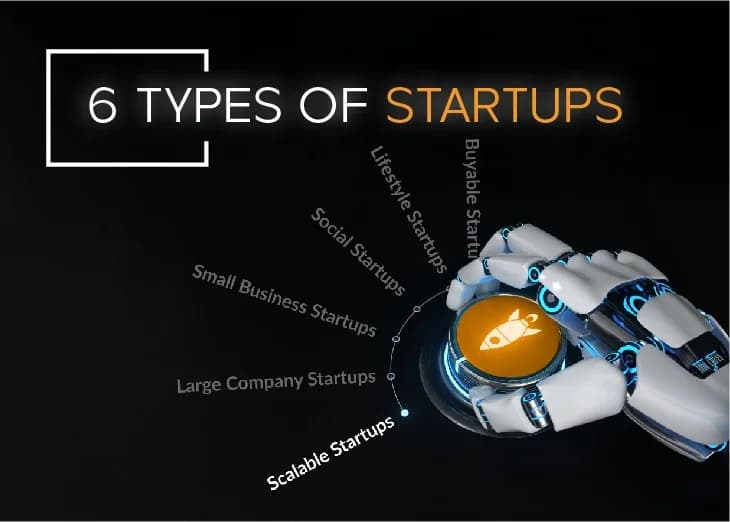The term “STARTUP” is increasingly becoming the latest buzzword in business and the economy all over the world. According to economists, startups are turning into the new engine of global economic change.
However, startups are not necessarily tech businesses, as there are also startups in the sectors of healthcare, education, cleaning, retail, finance, insurance, and many other industries.
So, what exactly are the startup types? Let’s dive in.
First - Scalable Startups
The scalable startup aims to turn, over time, into a high-growth, profitable corporation, and, thereby, requires external capital and a lot of risks to create demand and to expand.
Significantly, scalable startup founders have to draw up a plausible, persuasive business plan so they can convince other parties to provide them with impactful investments. This type of startup usually aims to compete with and replace other big successful companies.
When it comes to this startup model, we will find common characteristics, including, but not limited to, the fact that most scalable startup entrepreneurs are funded by Venture Capital investors. They’re also characterized by the intention of their founders to expand their business from the very outset —which is not generally the case with the majority of small business entrepreneurs. Also, scalable startups seek to generate enough revenue to reinvest in the business.
Given these features, a scalable startup is the right option for businesses whose startup idea has a large market available and vast growth potential, and, also, for founders who are innovators and ready to challenge the status quo, and who aspire to be the leaders of a specific industry. No wonder this type of startup includes such current giants as Facebook, Pinterest, and Uber!
Second - Large Company Startups
The facts of business are tough. Every so often, a successful, large company may find itself in an innovate-or-die situation! A big company usually has a limited life duration. With constant changes in technology, customer tastes & interests, the competitive landscape, legislations, the regulatory environment, and ever-changing market conditions, large companies often need to adapt their business model to survive and continue growing. And here comes the concept of this type of entrepreneurship, which refers to the advancement of new opportunities and ideas within already established companies.
Thanks to the support and capital of the already successful company, the offshoot startup is created to target new audiences, diversify product & service offerings, and, thereby, keep the strong position of the original big company in an ever-changing market.
With this in mind, the large company startup model is perfect for already established, successful companies that seek to diversify into a new market or niche that isn’t in the company’s existing range of activities. This model is also good if the company is looking for a way to compete with new companies and keep abreast of the changing market.
Third - Small Business Startups
This type of startup usually focuses on remaining successful in the market for a long time rather than focusing on scalability. Most businesses of this type are family businesses, barbershops, grocery stores, retail shops, hairdressers, grocery stores, travel agents, and bakers. They usually cater to a small target market.
Therefore, the Small Business Startup model is perfect for entrepreneurs who plan to hire family members, relatives, and local employees to operate the business. It’s the right fit for people that wish to add value to their communities and aspire to create a sustainable, long-lasting business, rather than pure profit.
Fourth – Social Startups
This type of startup is perfect for philanthropic entrepreneurs who establish this business not to make a profit but rather to do good to the community or the environment. This model is good for business founders who have an idea that can solve a problem, or alleviate social pain, especially for underprivileged communities.
Fifth — Lifestyle Startups
These are businesses that their founders create to earn a living by doing what they love! Examples of this type range from a dancer who opens a dance school, a voyage lover who runs a travel agency, a web developer who starts a freelance coding business, or a fashion designer who creates a fashion school. This startup model is the right fit for a passionate, creative, self-motivated type of person who is disciplined enough to be his or her own boss.
Sixth — Buyable Startups
Serial entrepreneurs usually create this type of startup not to enlarge, expand, and so on, but rather to sell it later to a larger company to make money out of the sale. Commonly tech businesses, with many of them usually in the app development industry, buyable startups are perfect for an entrepreneur who might have a startup idea with good growth potential but is not ready to commit to operating it long-term.
The Annual Investment Meeting, which will take place in Abu Dhabi on 8 - 10 May 2023, is the world’s leading platform for startups to maximize their potential, expand their network, and grow globally.
For more info about how AIM 2023 will add value to your startup
